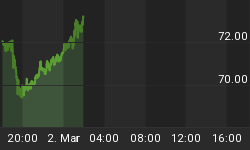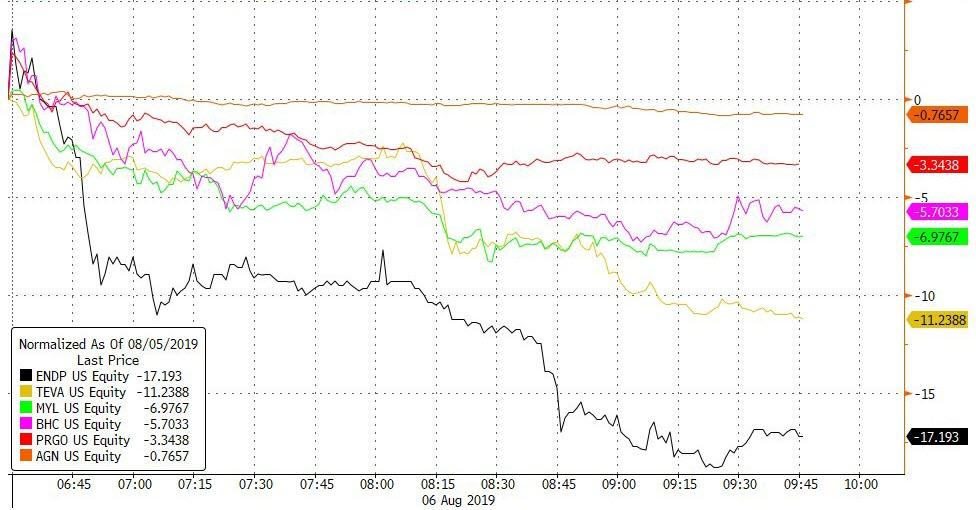Three major opioid distributors have offered to pay $10 billion to settle claims that the helped fuel the ongoing US opioid epidemic, as nearly 2,000 lawsuits loom against the drug giants, according to Bloomberg.
McKesson Corp, Cardinal Health Inc. and Amerisource Bergen Corp - which account for the majority of prescriptions supplied to pharmacies - made the verbal proposal while negotiating with a group of state attorneys general, according to three people familiar with the offer who aren't authorized to speak publicly on the matter.
(Click to enlarge)
The proposal marks the first time in two years of discussions that the three distributors have put an actual dollar figure on a resolution.
Responding to the offer, the National Association of Attorneys General countered with a demand for $45 billion paid over decades to cover the costs of the public health crisis brought on by opioid abuse, addiction and overdoses.
Whether the distributors and attorneys general can agree to a deal remains uncertain. But reaching a compromise may not be the toughest hurdle. The distributors face almost 2,000 additional lawsuits brought by cities and counties across the U.S., with a separate group of lawyers leading the litigation. Getting them to sign on to any deal could prove challenging.
McKesson spokeswoman Kristin Hunter Chasen said in an emailed statement, “We regularly engage with the state attorneys general, but the company has made no settlement offers.” Related: Battery Metals Face Looming Supply Crunch
The people familiar with the matter reiterated the companies -- including McKesson -- have made an opening proffer of a settlement price. Chasen declined to elaborate on McKesson’s discussions to resolve the litigation.
Spokeswomen for AmerisourceBergen and Cardinal Health declined to comment on the discussions or on what one company said was “speculation.” -Bloomberg
In July, UK-based drugmaker Reckitt Benckiser Group (RB Group) paid the US government a record $1.4 billion to end criminal and civil probes into allegations of illegal marketing of opioid addiction treatment medication, according to the US Justice Department.
According to Nephron Research analysts, a global settlement covering all opioid manufacturers could cost between $30 billion and $55 billion, while Wells Fargo analyst David Morris says it could reach $100 billion.
The ongoing lawsuits revolve around the claim that drugmakers - including Johnson & Johnson and Purdue Pharma LP - downplayed the risks of highly-addictive opioids, while overselling their benefits via 'hyper-aggressive marketing campaigns,' according to Bloomberg. Distributors, meanwhile, are accused of ignoring rampant painkiller abuse while illegally flooding states with pills.
One pharmacy in Kermit, West Virginia -- population 400 -- received almost 5 million doses from McKesson between 2005 and 2006, records show. About 30 miles from Kermit, the company shipped more than 5.8 million to a pharmacy in Mount Gay -- population 1,800 -- between 2006 and 2014. Another 2.3 million went to a pharmacy three miles away.
McKesson, Cardinal Health and AmerisourceBergen, along with other distributors, shipped a total of 76 billion pain pills over a six-year period starting in 2006, according to the U.S. Drug Enforcement Agency. The companies deny the governments’ allegations and have advanced dozens of legal and factual defenses, saying they complied with all state and federal laws. -Bloomberg
On Tuesday, lawyers from all sides will appear in federal court in Cleveland, Ohio, where many of the opioid lawsuits have been consolidated by US District Judge Dan Polster. The first trial was set to start Oct. 21, however the defendant companies have requested a dealy on the grounds that they need more time to prepare for "one of the most complicated trials in legal history."
Related: Another Surprising Industry Falls Victim To Ongoing Trade War Chaos
In an indication of how complicated settlement talks will be, local governments are pressing to set up their own negotiating class to represent more than 24,000 cities and counties to work a separate deal with the pharmaceutical industry. Many state attorneys general oppose the bid by cities and counties, an issue likely to come up at Tuesday’s hearing. -Bloomberg
"Fifty state attorney generals are better representatives of the people of their state," said Ohio Attorney General Dave A. Yost in a July 23 letter to Judge Polster, adding that private attorneys hired by local governments would profit handsomely from any settlement.
That said, there may be issues with an omnibus settlement, according to University of Georgia law professor Elizabeth Burch.
"So it’s hard to see how this deal would fly given it can’t be crammed down on all the cities and counties," she said, adding "The companies want closure. They don’t want to have to do two settlements."
In order to overcome this obstacle, the state attorneys general are looking to structure a deal with the distributors which offers incentives for cities and counties which agree to the terms, according to Bloomberg's sources. Those who join early will likely reap a greater share of the settlement.
University of Richmond law professor Carl Tobias also thinks it's going to be a tough nut to crack.
"It just may not make sense for the cities and counties to join this from a financial standpoint because they may be able to get more" through the cases they brought.
The cities and counties are worried any state deal would get used for general state expenses rather than local needs. They point to the $246 billion settlement in 1998 with tobacco companies in which few funds made their way to municipalities.
There already have been some state settlements.
In May, West Virginia agreed to accept $37 million from McKesson to resolve a suit brought by that state’s attorney general alleging it improperly distributed opioids there. West Virginia has the highest rate of drug-overdose deaths in the U.S.
Oklahoma, which sued drug makers rather than distributors, agreed in March to a $270 million payment from Purdue and then two months later accepted an $85 million accord with Teva Pharmaceutical Industries Ltd. A judge will rule later this month on Oklahoma’s claim J&J should pay as much as $17.5 billion for its role as the opioid crisis’ “kingpin.” The state plans to use the money for treatment of opioid addiction and research into the problem. -Bloomberg
The consolidated federal case is 17-md-2804.
By Zerohedge.com
More Top Reads From Safehaven.com

















